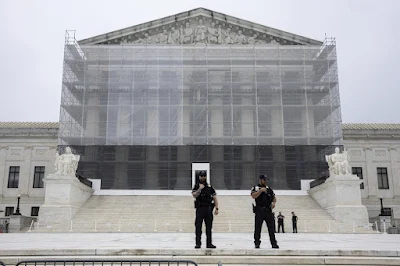The Supreme Court has rejected a conservative effort to contest an $8 billion subsidy program for phone and internet services.
Desk Report - 26 June 2025
Puplishing- David Lee
On June 27, the Supreme Court confirmed an $8 billion federal initiative that provides subsidies for high-speed internet and phone services to millions of Americans, dismissing a conservative argument that claimed the program was financed through an unconstitutional tax.
The case brought up issues regarding the extent to which Congress can “delegate” its legislative powers to a federal agency and whether the Supreme Court should tighten that standard.
In a 6-3 ruling, the court stated that Congress provided clear instructions on the operation of the program.
"For almost thirty years, the efforts of Congress and the (Federal Communications) Commission in creating universal-service programs have contributed to a more connected nation," Justice Elena Kagan expressed in her majority opinion. "And it has achieved this while maintaining the separation of powers that is fundamental to our Constitution."
Three of the six conservative justices disagreed with the majority. Justice Neil Gorsuch argued that the majority incorrectly determined that an executive agency has the authority to decide which taxes to impose, a power that belongs solely to Congress. "The framers distributed power among the legislative, executive, and judicial branches not for the sake of neatness, but to guarantee that our nation would truly be governed by 'We the People,'" Gorsuch stated in a dissent that was joined by Justices Clarence Thomas and Samuel Alito.
In 1996, Congress enacted a law that imposes a Universal Service Fund fee on telecommunications companies, which is then passed on to customers to enhance phone and internet access for households and hospitals in rural regions, low-income families, and public schools and libraries.
An independent administrator, regulated by the Federal Communications Commission, manages the distribution of the funds, collects the fees, and calculates the required amount to be raised each quarter. The FCC must approve this calculation before it is applied to determine the fees for each telecommunications carrier.
The conservative organization Consumers’ Research, along with a carrier and a group of consumers, contested this arrangement, which has been in place for nearly thirty years, claiming that it should be Congress, not the FCC – and certainly not a private entity – that decides the fee amount.
"Fundamentally, this case revolves around taxation without representation," stated Trent McCotter, an attorney representing the group, during a session at the Supreme Court in March. “Determining the amount of public revenue needed is a fundamental legislative decision, not merely a trivial detail to be addressed later.”
While appellate courts in Ohio and Georgia dismissed those claims, the 5th U.S. Circuit Court of Appeals in Louisiana ruled the universal service fee to be unconstitutional.
The lawsuit was part of a conservative initiative aimed at limiting the "administrative state," which has frequently found success at the Supreme Court.
However, Paul Clement, who was the solicitor general under former President George W. Bush – a Republican – represented a telecommunications trade association defending the program. He argued before the justices that this was not the appropriate case to revise Supreme Court rulings that have established a lenient standard for the non-delegation doctrine.
"We all gain from a communications system that is genuinely universal,” Clement remarked. “Even though I don't reside in rural Alaska, it's reassuring to have the ability to make a call there."
The Justice Department cautioned that labeling the funding model as unconstitutional could endanger numerous other initiatives.
According to the department, the telecommunications law adheres to the same delegation framework that Congress has applied across various sectors, including the prevention of unfair competition, the regulation of the securities industry, the assurance of food and drug safety, the management of labor relations, and the establishment of air-quality standards.
The primary case among the two that were combined for the proceedings is Federal Communications Commission v. Consumers’ Research.


















0 Comments